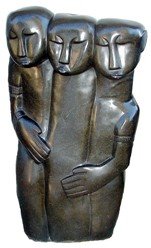 The grand showdown between the palace and its two adversaries finally seems to have produced one positive result. As part of a flurry of consultations, King Gyanendra met with the American, Chinese and Indian ambassadors Sunday.
The grand showdown between the palace and its two adversaries finally seems to have produced one positive result. As part of a flurry of consultations, King Gyanendra met with the American, Chinese and Indian ambassadors Sunday.Now that’s a far cry from the agonizing waits the palace secretariat inflicted on Their Excellencies. Which side was the real urgency on? The king’s it would appear.
Dive a little deeper to pursue the chain of events behind the smokescreen on the streets. During the height of the violent protests – and the massive government crackdown – much of the world erupted in condemnation of King Gyanendra. It was only after the security situation worsened, prompting U.S. House Speaker Dennis Hastert to cancel his delegation’s visit to Nepal, did India choose to break its silence. (Hastert, one may recall, is the man who would be president should George W. Bush and Vice-President Dick Cheney suddenly decide to renounce the world and go into seclusion)
As the warnings from New Delhi got stronger, former U.S. president Jimmy Carter, too, decided to call off his much-anticipated visit. Apparently, he believed the situation wouldn’t improve in time even for a purely recreational trek to Mustang. For now, the Indians and the Chinese have fended off the meddlesome Americans.
Don’t underestimate James F. Moriarty, though. He may have ordered a voluntary evacuation of the American Embassy to prove his point back home. He’s staying put to find out what alternatives New Delhi and Beijing can produce.
Remember he’s the guy that negotiated the release (in bits and pieces of course) of that American spy plane the Chinese had force-landed in 2001. And last year Moriarty flew into New Delhi to follow the scope and structure of the negotiations the SPA and the Maoists had huddled into.
Moriarty is all eyes and ears. This time probably more so on China. Moriarty’s deputy (substitute?) Elizabeth Millard, in her new capacity as a Bush administration adviser, became the highest American official to have gone on record saying Washington would consult with Beijing on Nepal. Nepal’s geopolitical profile, she told Nepalese reporters in a recent video conference, had just grown too big. The White House backed that claim in its National Security Strategy by citing state failure as a principal threat to the United States.
For each Asian giant, the Nimby Factor is too ingrained. The moves on the South Asian chessboard demand great dexterity to ensure no one gets the whole hog. Afghanistan got a full seat in the South Asian Association for Regional Cooperation only after Nepal and others ensured an observer status for China. Beijing, in turn, was allowed in only in partnership with Tokyo.
Then America got itchy and slid its foot in the door. South Korea wasn’t far behind. The whole international system gets complicated. Is Seoul, traditional ally of Washington, on America’s side? Or on China’s, considering Seoul’s traditional rivalry with Tokyo, which happens to be a Washington ally?
More relevant to our subject: Have Ambassadors Shiva Shankar Mukherji of India and Sun Heping of China devised a peace plan acceptable not only to themselves but also the Americans?
Indian Prime Minister Manmohan Singh described the Maoist insurgency in India as the greatest threat since independence to the country’s internal security. China’s recent National People’s Congress devoted much of its session on bridging that country’s rural-urban divide, the cause of much social – and potentially political – instability ( drawing up the agenda for which apparently forced State Councillor Tang Jiaxuan to reschedule his visit to Nepal).
An unstable Nepal bordering Tibet was bad enough. A Maoist Nepal that could revive in rural and poverty-stricken China memories of the good old days under The Great Helmsman is inconceivable.
Moriarty’s government, as we all know, sees in Prachanda’s Path the worst of the Cold War and post-9/11 order: communism and terrorism. With Maoist spokesman Krishna Bahadur Mahara and government spokesman Kamal Thapa agreeing that the rebels are full participants in the current street protests, the urgency for all three foreign players becomes self-evident.
Maybe those Sunday evening meetings were not really King Gyanendra’s idea. Come to think of it, did the three ambassadors actually seek a joint audience, which the monarch politely declined? And we still wonder what keeps King Gyanendra going.